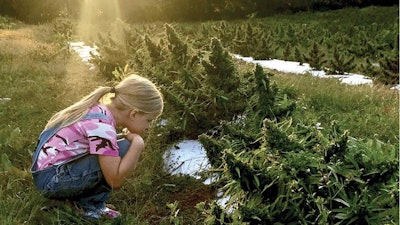
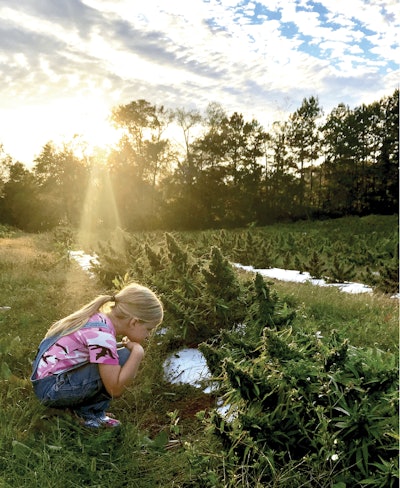
Family businesses can be defined by the strength of six dimensions, according to recent research by The Family Business Network and Egon Zehnder, the global management consulting and executive search firm. The No. 1 dimension, according to the research: Shared values.
This study revealed that shared values unite family members and provide a common framework for building relationships both within and outside the business. Shared values also give the business a moral center to help differentiate it in the marketplace and sustain it in the face of adversity.
If you spend any time talking to the members of the Justice family, who own The Hemp Mine LLC in South Carolina, one thing will become eminently clear: They epitomize a business of shared values. In just under two years, the Justice family has built an organization that prioritizes a love of farming and respect for farmers, a duty to the community and a tenacity to innovate.
For Allison Justice, Ph.D., the roots of these values run deep. Her maternal grandparents, Fred and Gladys Isbell, farmed cotton, and her mother, Deborah Justice, grew ornamental plants and raised cattle on the same plot of land. So, after she obtained degrees in horticulture from Clemson University and served as vice president of cultivation for the California cannabis company OutCo, Justice decided to return home to help her family start a hemp business.
Read more: Career Treks Into Commercial Cannabis
South Carolina launched a pilot program for growing hemp in 2018, offering 20 licenses for growing 20 acres each. The Hemp Mine obtained one of those licenses. But in the wake of hemp’s federal legalization through the Agricultural Improvement Act of 2018 (the 2018 Farm Bill), Justice saw an opportunity to expand her family’s legacy in farming and draw the family even closer together around a new cash crop. She also saw the chance to show a nascent industry how resilient the Justices really can be, having already made three successful farming pivots from cotton to ornamental planting to cattle.
Read more: Replacing Chemistry with Biology
“We’ve tried our best to be savvy about what we grow, knowing that we don’t have thousands of acres to take advantage of,” Justice says. “We have to be smart about what we’re growing, and it can’t be what everyone else is doing. We need to have a niche for ourselves—and that’s kind of always been the path we took as a family.”
Initially, Justice, along with her mother, Deborah, siblings Amanda and Matthew, and family friend M. Travis Higginbotham Jr., created a brand called The Hemp Mine to sell the cannabidiol (CBD) they were producing from hemp grown on their farm. In August 2018, the Justice family sought to diversify their business. They partnered with OutCo and an investor to create their own CBD extraction facility called SC Botanicals, which now also extracts oil for other farms in addition to The Hemp Mine. And recently, the Justices, ever-aware of changing market conditions and the need to carve out new niches for themselves, have turned their attention to another growth venture: genetics.
Ready for Change
With CBD hemp prices suffering from an oversupply of farmers rushing into the market, genetics give The Hemp Mine options for the future, Justice says. In August 2019, biomass was selling between $2.73 to $4.50 per percentage point of CBD content, according to pricing from PanXchange. By January 2020, that had fallen to less than $1.
“Where we see the most potential is in the genetics. So, we’re going to keep going on that path,” Justice says. “The regulations are changing daily, prices for CBD oil have dropped near seven times within a year, and so you have to be ready to pivot.”
Good genetics are in high demand, and the challenge of doing something different and difficult, like breeding cultivars, suits the Justice family well.
For example, back when the Justice family was growing ornamental plants, they were competing against large greenhouses with automated processes that could produce pansies for pennies. “We had to pivot and pick something that required a little more work, a little more research, and use our brain power to make a better-margin product,” Justice says. “When we were doing ornamentals, we had to stop and think, ‘What can we grow? What’s in high demand? What’s not out there? What might be different and a little more difficult to breed? Let’s teach ourselves whatever that is, master it and sell it.’”
What about Clematis armandii? For a time, the Justices grew the climbing plant of the genus Clematis prized by gardeners for its showy flowers. “It was something that people wanted, and it wasn’t out there,” Justice says. “It wasn’t out there because it was difficult to grow.”
“You have to be ready for change, because over the years, everything changes,” says Deborah Justice, who plays multiple roles for The Hemp Mine, including that of chief financial officer.
Fortunately for the business, the Justices’ closest non-family business partners share the same outlook.
Ashish Joseph, SC Botanicals’ CEO, believes a good pivot in business is one that creates options for future moves.
SC Botanicals has not only diversified its geographic customer base to include Tennessee, Alabama and North Carolina in addition to South Carolina, but also focused on the remediation of delta-9-tetrahydrocannabinol (THC). (Delta-9-THC is the chief intoxicant in cannabis.) To be legal under the 2018 Farm Bill, hemp must test at or below 0.3% total THC. If a hemp crop tests above the 0.3% limit, it’s known as “hot hemp,” which, to the federal government, is essentially illegal marijuana.
“THC remediation—not everyone can do it,” Joseph says. “It’s a very capital-intensive process. But we have developed our own technology, and it’s been going really well. You have people sending us material that’s hot, and we remove the delta-9-THC to compliant levels.”
As families, the Josephs and the Justices have a deep connection and similar value systems. Originally from the New York tri-state area, the Josephs purchased 20 acres of land in South Carolina in the mid-2000s with the intention of building houses on the property and relocating there. But then Joseph’s father had a change of heart; the family had been involved in multiple businesses in the Northeast and didn’t want to sell it all and move. So, they decided to rent out the land to the Justice family for farming purposes.
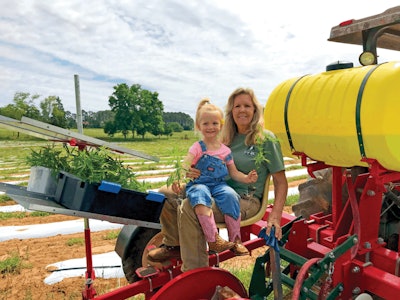
Olivia Schell, 4, with grandma Deborah Justice, who is The Hemp Mine CFO.
© Courtesy of The Hemp Mine / Amanda Justice Schell
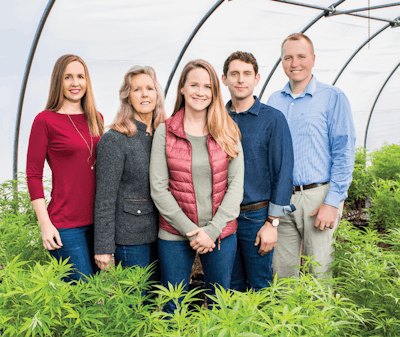
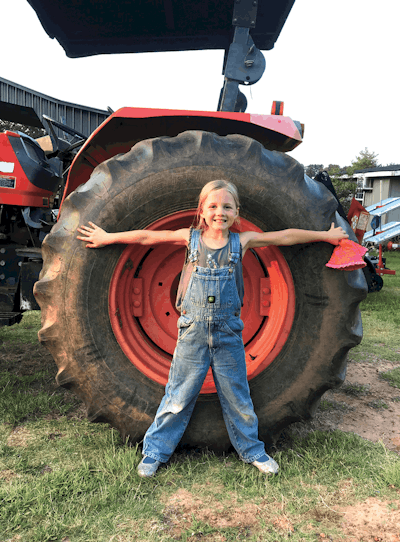
When the 2018 Farm Bill passed, the Justices reached out to the Josephs and asked if they could use the land to grow hemp. The Josephs not only agreed but also decided to join the venture, first as an investor in SC Botanicals.
“I was like, ‘Absolutely. Do you guys need any capital?’” Joseph recalls saying. “We know hemp isn’t cheap—whether it’s seeds or extraction, you need capital.”
Joseph’s role as SC Botanicals’ CEO follows his more traditional business background. He studied finance at Drexel University in Philadelphia and previously worked at an investment firm. However, farming is in his family’s blood as well: They were rubber tree farmers in India. His grandfather, father and uncles all had brokering licenses to supply Apollo Tyres Ltd., based in Gurugram, India, with the raw materials to make car tires.
“One thing my grandpa always taught me is don’t plant what everyone else is planting,” Joseph says. “It’s bad for business. ‘When people are cutting down their rubber trees to plant vanilla because vanilla prices are high, don’t do it,’ he said. Everyone’s going to do that, and the price of vanilla will drop. Meanwhile, the prices of rubber will go up.”
Now, along with the Josephs, the extended Justice family is bringing the same resolve and strategic mindset to the research and development of genetics. For her part, Justice sees genetics as a potentially lucrative growth business and a way to apply her previous cannabis knowledge and experience for the betterment of growers and farmers in the surrounding South Carolina community and the nation as a whole.
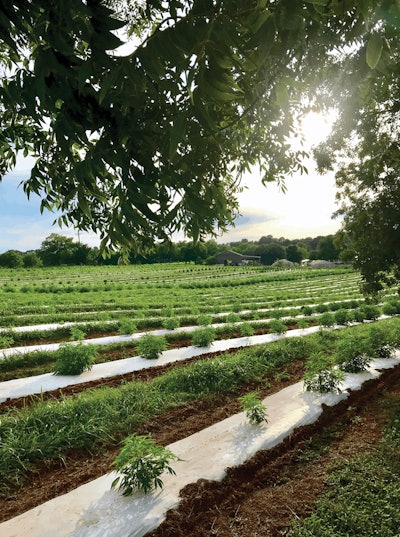
Resiliency From South Carolina to California
Most hemp farmers across the country are after the same thing: a cultivar that consistently yields a high percentage of CBD and a low percentage of THC. According to the U.S. Department of Agriculture’s (USDA’s) interim final rule, hot hemp crops must be disposed of. That puts a premium on good genetics. And while other factors do play some role in a crop’s final CBD and THC levels, genetics are a major determinant.
Decades of hemp prohibition and destruction of the nation’s hemp seed bank effectively erased centuries of innovation in American hemp genetics. That has put U.S. farmers at a competitive disadvantage compared to Europe, China and other countries with a longer history of hemp cultivation, which is only exacerbated by the THC limit imposed by the federal government. With a dearth of sufficient high-quality hemp genetics that remain at or below 0.3% THC through maturity, farmers and growers have struggled to locate specific strains and vet seed businesses, in some cases losing many thousands of dollars because they accepted the claims of unscrupulous seed suppliers.
“Watching my family and having a true respect for farmers—that’s one reason why we got into genetics in the first place, because I can’t stand people being taken advantage of,” Justice says. “Farmers are such hard workers who deserve more than most. That’s where the passion comes from for what we’re doing.”
After conducting several years of research and testing, The Hemp Mine is commercially offering seven different hemp varieties to greenhouse growers and field farmers during the 2020 crop year. Six of those seven hemp cultivars are focused on producing CBD, with the seventh focused on producing cannabigerol (CBG). In tests, the latter cultivar has proven to yield 12% CBG and 0.15% total THC.
“I am super excited about farming new cannabinoids,” says Matthew Justice, who plays a key role in managing operations for the company. “CBG in particular—one thing we’re hearing from people is that it induces hunger—I’m excited to see how that can help cancer patients and people with eating disorders.”
“2020 is going to be a truly defining year for hemp in the U.S.,” says M. Travis Higginbotham Jr., co-owner and vice president of sales, consumer products and genetics for The Hemp Mine. “We don’t quite yet understand what the U.S. market is capable of.”
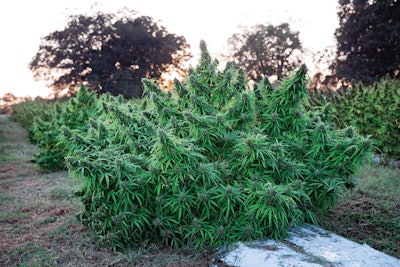
A Southern OG hemp plant right before harvest.
© Courtesy of The Hemp Mine / Amanda Justice Schell
Though there is plenty of CBD available based on the quantity of hemp biomass grown in 2019 and planned for 2020, Higginbotham says The Hemp Mine has an advantage in its plans to address farmers’ ongoing search for hemp genetics that remain below the legal THC threshold: its home state of South Carolina.
“What is the perfect climate for growing plants? It’s California,” says Higginbotham, who first met Justice while they were studying horticulture at Clemson. “When genetics are bred to perform in California, they encounter very little stress. They have many days of sun, very moderate temperatures and cool nights, which plants like.” In contrast, the South is one of the harshest growing environments in the U.S. based on heat, humidity, moisture, drought, disease and pests.
Thus, the selling proposition of The Hemp Mine’s cultivars is that they have performed well in the Southeastern part of the U.S., an indisputably harsh environment for crops. Higginbotham cautions, however, that farmers west of South Carolina still have to take two variables into consideration: frost and day length.
The pivot to genetics has already proven successful. The Hemp Mine now has several hemp varieties that have produced as much as 22% CBD in tests that measure delta-9-THC levels. Unfortunately, when testing for total THC, as required by federal rules, that number falls to 10% to 12%, Justice says.
Under the USDA’s interim final rule, state inspectors must test for the total THC level, which is comprised of delta-9-THC plus tetrahydrocannabinolic acid (THCA). THCA on its own does not produce psychoactive effects like delta-9-THC, but it can be converted to THC through decarboxylation, which is the process required for testing.
Justice says these regulations have given the family another cause to rally around.
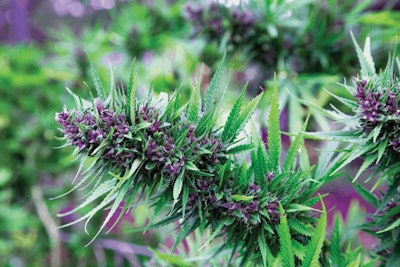
© Courtesy of The Hemp Mine / Amanda Justice Schell
Finding a Voice and Raising It
The 2018 Farm Bill required the USDA to craft a set of federal hemp rules but gave states the right to develop their own plans for enforcing them. After Oct. 31, 2020, all hemp producers must be in compliance with those rules, including farmers who were producing hemp under a state pilot program. As of press time, the USDA had approved only eight state plans. South Carolina wasn’t one of them.
The rulemaking process, while painstaking for the industry, has galvanized industrywide thinking. Justice has had her part in shaping that thinking, embracing the role as an active public-policy advocate. The company, for starters, has filed a lengthy comment with the USDA on issues ranging from the required harvesting window to sampling protocols. Justice is planning to address the matter with state lawmakers as well.
“In states like South Carolina, we feel like we’re going backwards,” Justice says. Under the state’s pilot program, many growers and farmers have just gotten comfortable with how to grow the plant, what varieties work and who to work with in the supply chain. The USDA’s new “stringent” regulations turn those practices on their head, Justice says.
As of press time, it is still unclear whether South Carolina will continue to operate under its pilot program plan or under a new USDA-approved hemp production plan for the 2020 crop year—and that is what has created so much confusion and business uncertainty, Justice says. The Hemp Mine’s genetics business has already been negatively impacted in particular because potential customers are holding off orders until a decision is made and rules are finalized.
“I can name a handful of farmers that have made the decision not to grow hemp or not to grow it again because there were already such difficulties in joining this industry that it’s just kind of the last straw,” Justice says. “It’s just not worth it.”
The uncertain regulatory situation has created another opportunity for The Hemp Mine as a consultant to new farmers and growers. With the family’s collective experience in hemp and horticulture, The Hemp Mine offers to guide farmers on everything from planting to harvest to extraction, advising on how to comply with regulations all along the way.
The Hemp Mine’s sales representatives have technical expertise and, in some cases, degrees in agriculture. “There’s so much help needed, whether it is for simple farming practices that [are] never simple [or] regulation compliance,” Justice notes.
Embracing the Pivot
Despite the challenges facing small, family-owned businesses, including size, scope and the availability of capital, many thrive. According to The Family Business Network and Egon Zehnder, family businesses that endure have the right vision, involvement, cohesion and interaction, family governance and clarity on leadership principles and roles. And, most critically, they have the right set of shared values.
“One of the qualities of our family is we are problem-solvers,” says Amanda Justice Schell, operations manager and co-owner of The Hemp Mine. “There are challenges in shifting and pivoting from one thing to another. I think we really met those challenges head-on and worked through it and found a way to be successful. Our attitude is: ‘We’ll make it work somehow and get through it and come out the other end.’”
Like her sister, Justice Schell is a Clemson graduate, but she has degrees in landscape architecture and construction-science management. A creative type and natural storyteller, Justice Schell plays a key role in marketing the family’s businesses, which involves web design and photography. One of her favorite things to do, she says, is to get out in the fields and take pictures of the “beautiful” hemp plants.
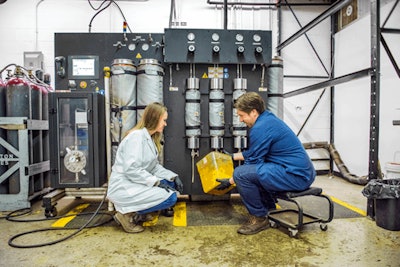
Justice Schell has three daughters—Isabel, 11; Heidi, 7; and Olivia, 4—who may even comprise the fourth generation of the Justice farming family. The Hemp Mine is even sponsoring Isabel’s volleyball team, a development that speaks to the community’s acceptance of the hemp plant after decades of stigma. For Justice Schell’s daughters, the family hemp business is something to be proud of.
“They love going out in the field, scouting for insects, picking off caterpillars, helping in any way that they can,” Justice Schell says. “They’re always saying, ‘Can we go to The Hemp Mine today?’”
To Deborah Justice, the matriarch of the family, this brings an indescribable joy.
Asked how her parents, Fred and Gladys Isbell, would feel about the family continuing the farming tradition in hemp, Deborah Justice answered, “Incredibly proud.”
“I get emotional talking about it,” she says. “Our family—we’re all together every day working as one. We all believe in [hemp] and the future of it. As a parent, you couldn’t ask for anything better.”














